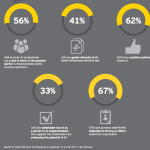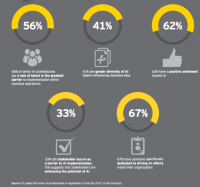A Guide To Uncertainty For People Who Hate Not Knowing
Life is full of uncertainty, both good and bad. Maybe you’re hopeful that a big meeting with a client will turn into a contract. Or perhaps you’re concerned about an upcoming evaluation at work. In either case, you won’t know where you stand until it actually happens. And in the meantime, you’ll have to deal with that uncertainty—something some people do better than others.
Unfortunately for those who hate not knowing, handling that well is an important part of long-term success. Every time you stretch yourself by trying something new, you’re leaving behind the comfort of knowing how things are likely to turn out.
What We Know About How Much We Hate Not Knowing
In a now-classic study, Amos Tversky and Eldar Shafir told undergraduates to imagine that they had just taken a difficult exam but didn’t yet know whether they’d passed; grades would be given out the next day.
They were also asked to imagine they had recently learned about a travel agency offering a heavily discounted vacation package, but the discount would expire that day. However, they could pay a small fee to extend the discount to the following day—when they would know the results of their exam. The majority of participants elected to pay the fee to wait an extra day.
Under other conditions in the same study, though, some participants were told that they took the exam and passed while others were told they’d taken it and failed. With the uncertainty removed, the majority of those that had been told they’d passed and the ones that had been told they failed elected to take the trip. In other words, resolving uncertainty was something many people were willing to pay for—even though it wouldn’t affect the choice they made one way or the other.
You may have a hard time keeping calm when outcomes are uncertain, but there are a few things you can do to help navigate uncertainty a little bit better. Here are three.
1. Project Yourself Into The Future
If you’re tempted to defer making a choice in the face of uncertainty, take a lesson from the Tversky-Shafir study. Just imagine that you know the outcome of the situation and ask yourself what you’d do then. You may find that the way an uncertain event turns out actually won’t affect your next move.
Often, uncertainty paralyzes people because they want a specific reason for engaging in an action. That reason may be different depending on the outcome of the uncertain event, even if the course of action being taken is the same—our rationales may shift, even if the choices they support don’t. It’s just that someone taking a trip after a tough exam is either celebrating a success or consoling a failure, and people simply may want to know which they’re doing.
When you project yourself into the future, you can better understand the possible reasons for future courses of action based on what might happen. And that may help you move forward with your plans, even when you aren’t sure which reason will apply.
2. Do What You Can Do—And Know What You Can’t
There’s often pressure to continue working on projects, even if that additional work won’t improve the odds of success. Many people understandably dislike that. In cases like these, the theologian Reinhold Niebuhr’s well-known “Serenity Poem” actually has some psychological clout:
God, grant me the serenity to accept the things I cannot change,
Courage to change the things I can,
And wisdom to know the difference.
In many cases, uncertainty leads you to keep making an effort long past the point of diminishing returns. Yet successful people learn to evaluate when their additional work on a project doesn’t make it better, it only makes it different. And that relies on knowing your limits—the things you can’t change—when you don’t know the ultimate outcome. At that point, they move on to the next project and await the results to reveal themselves.
To calibrate your efforts, it’s helpful to simply find people you trust to evaluate your work. Ask for their periodic assessments and then see how they square with your own judgments. Sounds easy (and it is), but it can help you fend off the fear of uncertainty that’s rooted in a shaky sense of your own impact. Over time, you’ll begin to get a feel for when a project is done enough.
3. Use The Likelihood Of Failure To Get Creative
If you’ve heard this one before, it’s for good reason. Some of the most successful people really are those with a high tolerance for failure—the prospect of which often causes paralysis in others. People tend to avoid engaging in activities whose outcomes are uncertain, for a variety of pretty obvious reasons: the impact on their reputation, wasted effort, etc.
It’s important to recognize that one consistent finding from multiple studies of creativity is that the people who have the best ideas are often ones who have the most ideas. Quantity, generally speaking, leads to quality. But that also means that the people who have the most ideas also have the most mediocre ideas—you simply need to let yourself generate them so you can sort the good from the so-so and the bad.
When a situation’s outcome is uncertain and it’s making you nervous, pay attention to that signal—which means you’ve moved past the familiar procedures and the predictable results they yield. In those situations, failure rarely has disastrous consequences. Instead, most failures lead to valuable learning opportunities that make our future efforts more likely to succeed. Ultimately keeping that in mind can help you get more comfortable with the uncertainty in between.
Fast Company , Read Full Story
(14)













